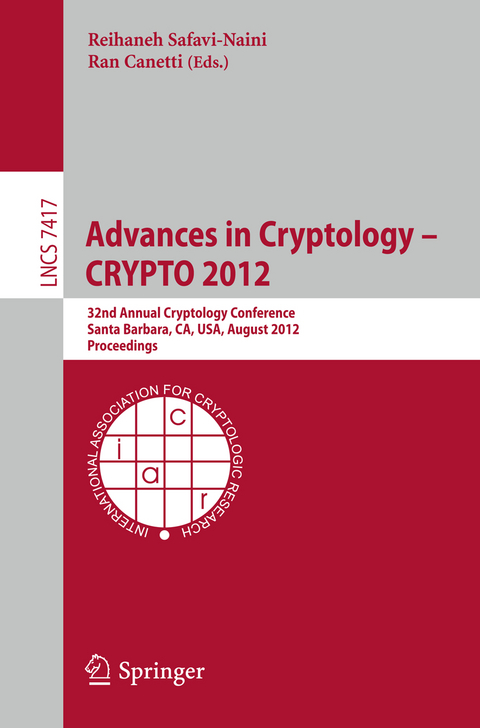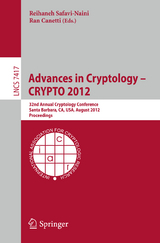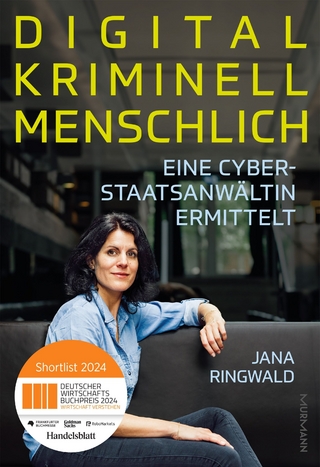Advances in Cryptology -- CRYPTO 2012
Springer Berlin (Verlag)
978-3-642-32008-8 (ISBN)
Symmetric Cryptosystems.- An Enciphering Scheme Based on a Card Shuffle.- Tweakable Blockciphers with Beyond Birthday-Bound Security.- Breaking and Repairing GCM Security Proofs.- On the Distribution of Linear Biases: Three Instructive Examples.- Substitution-Permutation Networks, Pseudorandom Functions, and Natural Proofs.- Invited Talk.- The End of Crypto.- Secure Computation I.- Adaptively Secure Multi-Party Computation with Dishonest Majority.- Collusion-Preserving Computation.- Secret Sharing Schemes for Very Dense Graphs.- Attribute-Based and Functional Encryption.- Functional Encryption with Bounded Collusions via Multi-party Computation.- New Proof Methods for Attribute-Based Encryption: Achieving Full Security through Selective Techniques.- Dynamic Credentials and Ciphertext Delegation for Attribute-Based Encryption.- Functional Encryption for Regular Languages.- Proof Systems.- Database Commitments and Universal Arguments of Quasi Knowledge.- Succinct Arguments from Multi-prover Interactive Proofs and Their Efficiency Benefits.- Protocols.- On the Security of TLS-DHE in the Standard Model.- Semantic Security for the Wiretap Channel.- Multi-instance Security and Its Application to Password-Based Cryptography.- Hash Functions.- Hash Functions Based on Three Permutations: A Generic Security Analysis.- Hash or Not to Hash Again? (In)Differentiability Results for H2 and HMAC.- New Preimage Attacks against Reduced SHA-1.- Stam's Conjecture and Threshold Phenomena in Collision Resistance.- Composable Security.- Universal Composability from Essentially Any Trusted Setup.- Impossibility Results for Static Input Secure Computation.- New Impossibility Results for Concurrent Composition and a Non-interactive Completeness Theorem for SecureComputation.- Black-Box Constructions of Composable Protocols without Set-Up.- Privacy.- Crowd-Blending Privacy.- Differential Privacy with Imperfect Randomness.- Leakage and Side-Channels.- Tamper and Leakage Resilience in the Split-State Model.- Securing Circuits against Constant-Rate Tampering.- How to Compute under AC0 Leakage without Secure Hardware.- Invited Talk.- Recent Advances and Existing Research Questions in Platform Security.- Signatures.- Group Signatures with Almost-for-Free Revocation.- Tightly Secure Signatures and Public-Key Encryption.- Implementation Analysis.- Efficient Padding Oracle Attacks on Cryptographic Hardware.- Public Keys.- Secure Computation II.- Multiparty Computation from Somewhat Homomorphic Encryption.-Near-Linear Unconditionally-Secure Multiparty Computation with a Dishonest Minority.- A New Approach to Practical Active-Secure Two-Party Computation.- Black-Box Separation.- The Curious Case of Non-Interactive Commitments - On the Power of Black-Box vs. Non-Black-Box Use of Primitive.- Cryptanalysis.- Efficient Dissection of Composite Problems, with Applications to Cryptanalysis, Knapsacks, and Combinatorial Search Problems.- Resistance against Iterated Attacks by Decorrelation Revisited.- Quantum Cryptography.- Secure Identity-Based Encryption in the Quantum Random Oracle Model .- Quantum to Classical Randomness Extractors.- Actively Secure Two-Party Evaluation of Any Quantum Operation.- Key Encapsulation and One-Way functions.- On the Impossibility of Constructing Efficient Key Encapsulation and Programmable Hash Functions in Prime Order Groups.- Hardness of Computing Individual Bits for One-Way Functions on Elliptic Curves.-Homomorphic Evaluation of the AES Circuit.- Fully Homomorphic Encryption without Modulus Switching from Classical GapSVP.
An Enciphering Scheme Based on a Card Shuffle.- Tweakable Blockciphers with Beyond Birthday-Bound Security.- Breaking and Repairing GCM Security Proofs.- On the Distribution of Linear Biases: Three Instructive Examples.- Substitution-Permutation Networks, Pseudorandom Functions, and Natural Proofs.- Invited Talk.- The End of Crypto.- Secure Computation I.- Adaptively Secure Multi-Party Computation with Dishonest Majority.- Collusion-Preserving Computation.- Secret Sharing Schemes for Very Dense Graphs.- Attribute-Based and Functional Encryption.- Functional Encryption with Bounded Collusions via Multi-party Computation.- New Proof Methods for Attribute-Based Encryption: Achieving Full Security through Selective Techniques.- Dynamic Credentials and Ciphertext Delegation forAttribute-Based Encryption.- Functional Encryption for Regular Languages.- Proof Systems.- Database Commitments and Universal Arguments of Quasi Knowledge.- Succinct Arguments from Multi-prover Interactive Proofs and Their Efficiency Benefits.- Protocols.- On the Security of TLS-DHE in the Standard Model.- Semantic Security for the Wiretap Channel.- Multi-instance Security and Its Application to Password-Based Cryptography.- Hash Functions.- Hash Functions Based on Three Permutations: A Generic Security Analysis.- Hash or Not to Hash Again? (In)Differentiability Results for H2 and HMAC.- New Preimage Attacks against Reduced SHA-1.- Stam's Conjecture and Threshold Phenomena in Collision Resistance.- Composable Security.- Universal Composability from Essentially Any Trusted Setup.- Impossibility Results forStatic Input Secure Computation.- New Impossibility Results for Concurrent Composition and a Non-interactive Completeness Theorem for Secure Computation.- Black-Box Constructions of Composable Protocols without Set-Up.- Privacy.- Crowd-Blending Privacy.- Differential Privacy with Imperfect Randomness.- Leakage and Side-Channels.- Tamper and Leakage Resilience in the Split-State Model.- Securing Circuits against Constant-Rate Tampering.- How to Compute under AC0 Leakage without Secure Hardware.- Invited Talk.- Recent Advances and Existing Research Questions in Platform Security.- Signatures.- Group Signatures with Almost-for-Free Revocation.- Tightly Secure Signatures and Public-Key Encryption.- Implementation Analysis.- Efficient Padding Oracle Attacks on Cryptographic Hardware.- Public Keys.- Secure Computation II.- Multiparty Computation from Somewhat Homomorphic Encryption.- Near-Linear Unconditionally-Secure Multiparty Computation with a Dishonest Minority.- A New Approach to Practical Active-Secure Two-Party Computation.- Black-Box Separation.- The Curious Case of Non-Interactive Commitments - On the Power of Black-Box vs. Non-Black-Box Use of Primitive.- Cryptanalysis.- Efficient Dissection of Composite Problems, with Applications to Cryptanalysis, Knapsacks, and Combinatorial Search Problems.- Resistance against Iterated Attacks by Decorrelation Revisited.- Quantum Cryptography.- Secure Identity-Based Encryption in the Quantum Random Oracle Model .- Quantum to Classical Randomness Extractors.- Actively Secure Two-Party Evaluation of Any Quantum Operation.- Key Encapsulation and One-Way functions.- On the Impossibility of Constructing Efficient Key Encapsulation and Programmable Hash Functions in Prime Order Groups.- Hardness of Computing Individual Bits for One-Way Functions on Elliptic Curves.- Homomorphic Evaluation of the AES Circuit.- Fully Homomorphic Encryption without Modulus Switching from Classical GapSVP.| Erscheint lt. Verlag | 5.7.2012 |
|---|---|
| Reihe/Serie | Lecture Notes in Computer Science | Security and Cryptology |
| Zusatzinfo | XV, 888 p. 103 illus. |
| Verlagsort | Berlin |
| Sprache | englisch |
| Maße | 155 x 235 mm |
| Gewicht | 1335 g |
| Themenwelt | Informatik ► Netzwerke ► Sicherheit / Firewall |
| Informatik ► Theorie / Studium ► Kryptologie | |
| Mathematik / Informatik ► Mathematik | |
| Schlagworte | Elliptic Curves • Hash Functions • Multi-Party Computation • provable security • side-channel attacks |
| ISBN-10 | 3-642-32008-2 / 3642320082 |
| ISBN-13 | 978-3-642-32008-8 / 9783642320088 |
| Zustand | Neuware |
| Haben Sie eine Frage zum Produkt? |
aus dem Bereich




